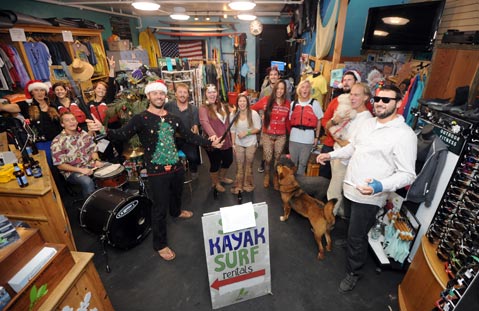Riding the New Economy’s Ethical Wave
Channel Islands Outfitters Becomes a “For Benefit” Corporation

What would the world look like if capitalism wasn’t just all about the bottom line?
A whole lot more hopeful, say a growing number of business owners across the United States, and, to prove their point, they’re turning their companies into “for benefit corporations.” The designation — which requires a simple rewriting of a company’s articles of incorporation and is now recognized by 17 states, including California and, most recently Delaware, home to many large corporations — establishes a public benefit purpose for a business, thereby preserving the founders’ value-driven intentions by protecting the board of directors from being sued by a company’s shareholders for not just maximizing profits. Additionally, most of those companies are also submitting themselves to a thorough vetting by the B Lab, a third-party entity that issues the “B Corp” certification for companies that follow “rigorous standards of social and environmental performance, accountability, and transparency.”
Only six Santa Barbara companies have taken the plunge so far, but Garrett Kababik of Channel Islands Outfitters — which reincorporated as “for benefit” in 2012 with the express intent to “save the oceans and natural places” — is already waving the flag sky-high. He fears that money-grubbing companies are the biggest threat to the world, comparing them to the world-destroying robots that humans created in the movie The Terminator. “We’ve done that, but we haven’t done it with machines — we’ve done it with corporations,” said Kababik. “There’s no humanity behind corporations. It’s like creating a machine to do all your dirty work.”
When he and his partners, Fraser Kersey and Johnny Dresser, purchased the kayak tours/rentals/much more company Paddle Sports in 2010 after many years of being guides, they wanted to ensure that making money wasn’t their only goal. They heard about B Corps back then, but were advised that it made no economic sense for a young company. Kababik kept studying the trend, eventually reading a book called Firms of Endearment and watching a new sort of economy emerge across the planet as the idea of “impact investments” began to soar.
So in 2012, taking a cue from Yvon Chouinard at Patagonia — whose “for benefit” status will ensure that the use of organic cotton, for instance, overrides future shareholder desires for more money — Kababik made the same move, and now Channel Islands Outfitters evaluates every decision based on its impacts and relation to the community, the environment, his customers, his employees, and his suppliers. Kababik hasn’t regretted it since, believing that while it “costs craploads,” the research shows that companies that create a culture around their business eventually reap the financial rewards as well, with greater stability to withstand downturns in the economy.
Though Kababik doesn’t think he’s actually attracted any additional business yet — which he thinks is largely because the public doesn’t know much about B Corps yet — he knows his staff, which ranges from about 50 in the high season to a dozen or so in the off-season, is stoked, as they are paid a living wage as well as 20 hours per year for volunteering, not to mention getting the option to take six months off and still get their job back. “This actually means more to employees than customers right now,” he explained.
It’s also important for companies, like Kababik’s, that hope to grow in the years to come by taking on new investors. “We want to make sure we’re aligned with people who care,” he said of how the status will keep the company’s socially and environmentally minded culture. “Value driven — this is the future of business.” He’s hopeful that more companies will get in line to do the same, asking, “Imagine if Coca-Cola did something like this?”
Learn more at bcorporation.net and channelislandso.com.



